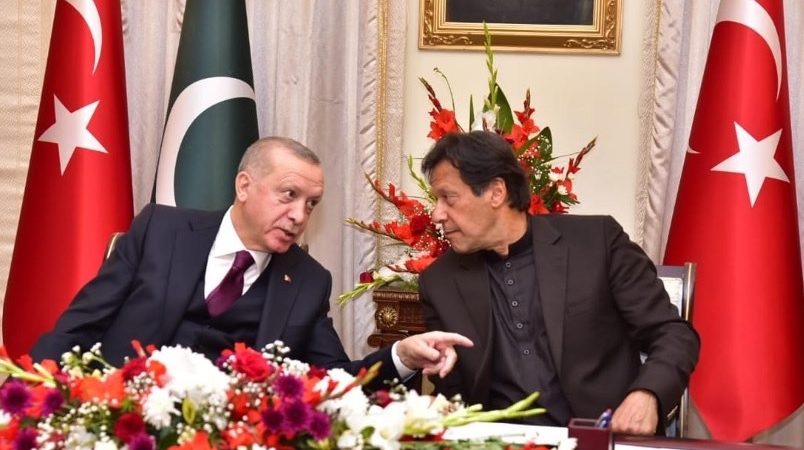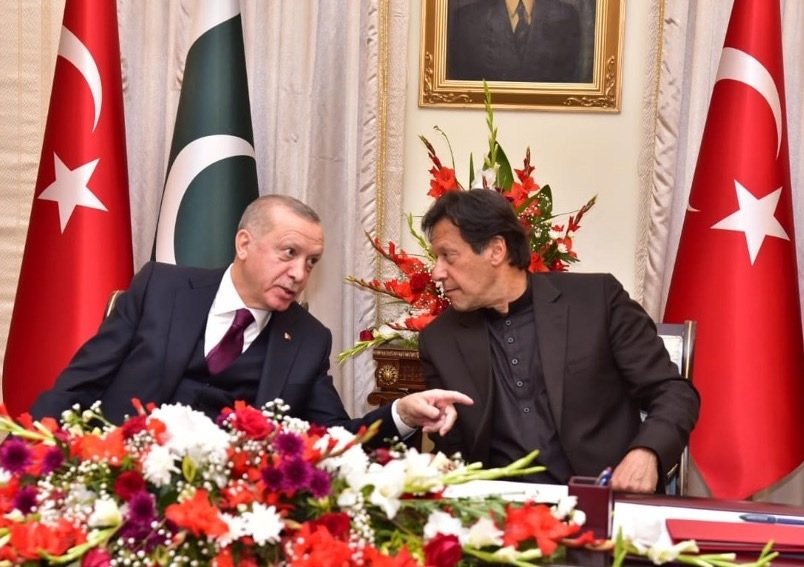
Terrorism Woes of Turkey, Pakistan

By James Crickton
Pakistan and Turkey, working to carve out a new Islamic alliance, have become close allies in a new enterprise – terrorism directly and through money-laundering. And their reaction to FATF decision to place them in the “Grey List” is no different.
The UN-designated Financial Action Task Force (FATF) placed Turkey in the Grey List at its recent plenary in Paris. The Islamist vigilantes dominated Pakistan achieved the honour for the second time in 2018 with no prospects of exit from FATF radar.
Economically, the two Muslim nations are not in the same league. Pakistan has been living on IMF doles almost from the time it was carved out of British India as the home of the pure for Muslims of the sub-continent. Feudalism is its bane. So is poverty. Compounding these miseries are debt burden and non-state actors in the pay rolls of the Army for making neighbours bleed with thousands of cuts.
Turkey is in a different league – politically, financially and diplomatically. It is the twentieth-largest in the world by nominal GDP, and the eleventh-largest by PPP (Purchasing Power of People). In fact, it is the largest economy among the 23 nations that have been under the FATF scrutiny. But in recent months and weeks, Ankara has misused its economic heft and today faces a precarious economy, a major currency crisis with the plunging of the Lira, economic overheating and flight of foreign investors.
“FATF’s grey listing of Turkey will further tarnish the country’s image as a permissive jurisdiction for illicit financial activity,” according to. Aykan Erdemir, senior director of the Turkey program at the Foundation for Defense of Democracies, a Washington-based think tank.
Turn of events show that Turkey has much more to lose than Pakistan. Firstly, because it is the bridge between southeastern Europe and Asia. Secondly, because Turkey is deeply suspected to be mixed up with the IS and outfits active across the Middle East.
Pakistan’s FATF troubles are no less IS centric. The FATF has been nudging it to curb funds flow to Lashkar-e-Tayyaba (LeT) with global ambitions and to other domestic militant outfits operating as affiliates of al Qaida and Islamic State (IS). The Paris plenary decision to continue Pakistan on the grey list signals no change in the ground situation.
In recent times, Pakistan has relied on Turkey, along with China and Malaysia, to keep itself out of the FATF Black List, which would entail economic sanctions. Such bailouts demand support by three -member nations.
With Turkey itself on a sticky wicket, Pakistan will find it difficult to duck the Black List should the threat arise at the next FATF plenary. Blaming its arch rival India or unfriendly vibes from Biden administration may offer a talking point before the domestic audience but not relief the Pakistan economy badly needs.
Many anti-money laundering and counter-terrorism regulators view transactions in or involving grey list jurisdictions as being higher risk. As such international financial institutions may seek to reduce their exposure to such nations. This is clear from a recent IMF (International Monetary Fund) finding that grey list ranking has “a significant negative impact on a country’s capital flows”
Financial wizards aver that Turkey will suffer loss of investments from the European Union and the Western powers as a whole. Its 15-year-old dream of becoming a member of the European Union may remain just a dream for a very long time unless President Erdogan gives up his misguided pursuits in West Asia and rolls back his plans to challenge the US and Saudi Arabia.
FATF’s concerns vis-à-vis Turkey are two-fold. One on account of its proximity to Syria, Iraq, and Lebanon. Two on account of reports that terrorist groups may be purchasing real estate. An additional factor is Islamist terrorist groups using the Turkish financial sector to launder funds and participate in the global economy.
It is against this backdrop that the European Commission has read the riot act, expressing disappointment at the limited progress Turkey has made in its fight against organized crime. And asked Turkey to improve its legal framework relating to anti-money laundering and counter-terrorism (AML/CFT) laws in line with FATF guidance.
FATF President Marcus Pleyer of Germany was more to the point in his post-plenary press meet, saying Turkey needs to address “serious issues of supervision” in its banking and real estate sectors, and with gold and precious stones dealers.
“Turkey needs to show it is effectively tackling complex money laundering cases and show it is pursuing terrorist financing prosecutions…and prioritizing cases of UN- designated terrorist organisations such as ISIL and al Qaeda,” Pleyer said.
The FATF diktats and their fall-out will have a negative impact on Turkish-Pakistan relations, although Ankara is not an aid-giver to Islamabad. Ties have burgeoned with President Recep Tayyip Erdogan and Prime Minister Imran Khan exchanging high-profile state visits and working on ways to boost bilateral ties.
Both leaders have been kicking up the Kashmir issue and India-baiting, particularly at the OIC, but this has not cut much ice with either the European Union or with the Islamic nations. Ignoring the Pak-Turkey tango, the Gulf nations have forged close ties with India, to the dismay of civilian rulers in Islamabad and the GHQ Shura in Rawalpindi.
Erdogan -Imran combine even planned to force either the OIC or the Gulf Cooperation Council (GCC) to raise the Kashmir issue. Success eluded them because of a self-inflicted wound – campaign to float a rival OIC with the help of Malaysia. The move annoyed Saudi Arabia, which has been engaged in a turf war with Turkey at the OIC and other Islamic fora.
Riyadh, as a major aid giver (Saudis along with Allaha and Army are the trinity guiding Pakistan) turned its ire on Islamabad and called back three billion dollars advanced earlier to help Pakistan avert a payment crisis. It required Pakistan Army Chief, Gen. Bajwa, to use his good offices with Crown Prince Mohammed bin Salman to patch up the frayed ties.
Erdogan-Imran friendship has led to cooperation in newer areas such as Pakistan importing Turkish television programmes that dwell on “Islamic renaissance”. Some of these programmes which have become a staple diet for the Pakistani elite as also TV audience seek to forge religio-cultural ties, while glorifying the achievements of the Ottoman Empire that Erdogan is seeking to resurrect.
Erdogan has gone out of his way to second Pakistani stand on Kashmir. And earned the gratitude of Prime Minister Imran Khan, as also the Pakistan Army. Both are delighted that Turkey is next to iron friend China with its abiding support to their country’s anti-India campaign.
All this India bashing and Kashmir outcry offer no manna either to Pakistan or Turkey. With the FATF breathing down its neck literally, the situation remains precarious for Pakistan. It could get worse for Turkey.
-
CHINA DIGEST
-
 ChinaChina Digest
China’s PMI falls for 3rd month highlighting challenges world’s second biggest economy faces
ChinaChina Digest
China’s PMI falls for 3rd month highlighting challenges world’s second biggest economy faces
-
 ChinaChina Digest
Xi urges Chinese envoys to create ‘diplomatic iron army’
ChinaChina Digest
Xi urges Chinese envoys to create ‘diplomatic iron army’
-
 ChinaChina Digest
What China’s new defense minister tells us about Xi’s military purge
ChinaChina Digest
What China’s new defense minister tells us about Xi’s military purge
-
 ChinaChina Digest
China removes nine PLA generals from top legislature in sign of wider purge
ChinaChina Digest
China removes nine PLA generals from top legislature in sign of wider purge
-
-
SOUTH ASIAN DIGEST
-
 South Asian Digest
Kataragama Kapuwa’s arrest sparks debate of divine offerings in Sri Lanka
South Asian Digest
Kataragama Kapuwa’s arrest sparks debate of divine offerings in Sri Lanka
-
 South Asian Digest
Nepal: Prime Minister Dahal reassures chief ministers on police adjustment, civil service law
South Asian Digest
Nepal: Prime Minister Dahal reassures chief ministers on police adjustment, civil service law
-
 South Asian Digest
Akhund’s visit to Islamabad may ease tensions on TTP issue
South Asian Digest
Akhund’s visit to Islamabad may ease tensions on TTP issue
-
 South Asian Digest
Pakistan: PTI top tier jolted by rejections ahead of polls
South Asian Digest
Pakistan: PTI top tier jolted by rejections ahead of polls
-






Comments